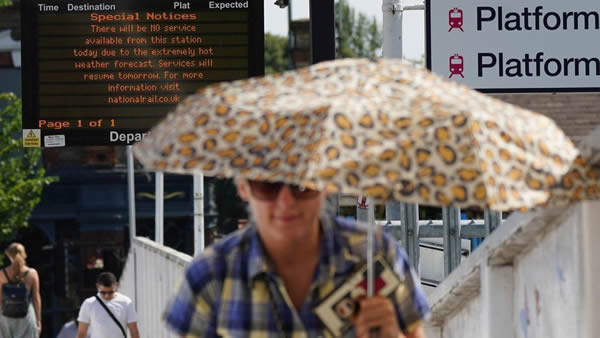
The UK has recorded a temperature of over 40C (104F) for the first time – as the heat continues to rise.
Thermometers hit 40.2C at London Heathrow at 12.50 BST, breaking a record temperature of 39.1C in Charlwood, Surrey, registered earlier.
But Tuesday’s temperatures are expected to climb higher still, with places along the A1/M1 corridor expected to see up to 42C later.
Scotland is also expected to surpass its historic reading of 32.9C.
In Wales, Rhyl, Flintshire, recorded 33.4C at 11:00 BST.
The Met Office has issued a red extreme heat warning covering much of central, northern, and south-east England.
Network Rail has warned against travel, road surfaces have warped, and a number of power cuts have been reported across Yorkshire.
At least five people have died in and around water over the past two days amid warnings about the dangers of open water.
BBC Weather’s Simon King said: “For meteorologists, exceeding records by a margin of two or three degrees is a staggering thought when historically records were only broken by fractions of a degree.”
As temperatures rapidly rise on Tuesday, emergency responses have been issued across the UK:
- Emergency services are searching for a person believed to be missing off Clacton Pier in Essex
- A man died after being pulled from the sea on the Isle of Wight
- Sagging conductors and overheating transformers caused faults with the power network in Yorkshire
- Network Rail issued a “do-not-travel” warning for Tuesday, affecting services travelling through the “red zone”
- Thameslink, Great Northern, East Midlands and East Coast services are heavily disrupted – or cancelled altogether
- The Supreme Court moved hearings online, while the British Museum confirmed it would shut early at 15:00
The extreme warning, indicating a threat to life, is in place in an area stretching between London, Manchester and York.
There was a markedly cooler outlook for Penzance, Cornwall, where thundery storms hit the popular holiday destination and were projected to last until midday.
But by 16:00, Lincoln, Cambridge and Huntingdon could also see 40C – and areas in the A1/M1 corridor may surpass this.
Meanwhile, provisional figures showed the UK experienced the warmest night on record from Monday into Tuesday.
Emley Moor in West Yorkshire is likely to have broken the night time record, where 25.9C was recorded overnight, according to the Met Office.
Rail services on Monday evening were heavily impacted by the extreme heat, Network Rail said, with buckled rails reported and overhead wire systems failing. A new record rail temperature of 62C was recorded in Suffolk.
Jake Kelly, the group director for system operation at Network Rail, said it had taken “the difficult and regrettable” decision to close the East Coast Mainline and the Midland Mainline due to record temperatures.
Mr Kelly told BBC Radio 4’s Today programme: “We don’t take decisions like this lightly. Our engineers work very hard assessing the capability of the infrastructure facing that record heat, and we decided that we had no choice but to close it.”
Transport Secretary Grant Shapps said the UK’s rail network could not cope with the extreme heat, adding that it would take “many years” before upgrades would mean services could handle the hotter climate.
“The simple answer is no, the network cannot cope with the heat right now,” he told BBC Breakfast. “In 40C heat, tracks can reach 50C, 60C, and even 70C, and there’s a severe danger of tracks buckling and a terrible derailing.
“We are building new specifications, creating overhead lines that can withstand higher temperatures. But with the best will in the world, this is infrastructure which has taken decades to build, with some of our railways stretching back 200 years.”
Runways at Luton Airport and RAF Brize Norton were impacted by the heat on Monday – forcing aircraft to divert.
There have also been warnings of pressure on hospitals and ambulance services as temperatures are set to peak on Tuesday afternoon.
Health Secretary Steve Barclay said more call handlers had been put in place and additional funding had been made available for ambulance and 111 services.
London Ambulance Service said it fielded 6,600 calls on Monday related to the heatwave, experiencing a peak of 300 calls at 23:00.
Brian Jordan, director of 999 operations at London Ambulance Service, said he was “very pleased” that the number of callers fell short of the 8,000 expected.
“Yesterday was still a busy and long day, and I cannot emphasise enough that people need to follow the same advice as Monday and avoid exposure to the sun,” he told the Today programme.
“Early indications show a slight increase in fainting due to heat exposure. We could see this rise in even higher temperatures today.”
He added that the service had “been working really closely” with hospitals to ensure waits are not longer than normal.
Monday saw a number of schools close despite government advice against doing so, although one teaching union said the majority of schools had remained open.
Water companies in southern and eastern England have warned increased demand is leading to low pressure – and even interrupted supply – for some households.
Source: BBC























